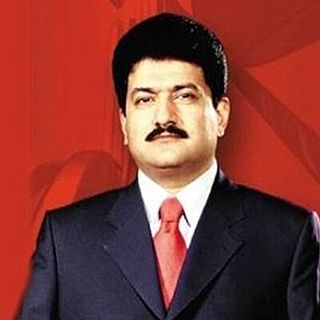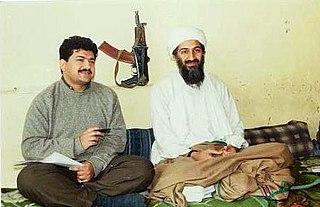
Al-Qaeda is a pan-Islamist militant organization led by Sunni Jihadists who self-identify as a vanguard spearheading a global Islamist revolution to unite the Muslim world under a supra-national Islamic caliphate. Its membership is mostly composed of Arabs, but also includes people from other ethnic groups. Al-Qaeda has mounted attacks on civilian, economic and military targets of the US and its allies; such as the 1998 US embassy bombings, the USS Cole bombing and the September 11 attacks. The organization is designated as a terrorist group by NATO, UN Security Council, the European Union, and various countries around the world.

Osama bin Mohammed bin Awad bin Laden was a Saudi Arabian-born Islamist dissident and militant leader who was the founder and first general emir of al-Qaeda from 1988 until his death in 2011. Ideologically a pan-Islamist, he participated in the Afghan jihad against the Soviet Union and supported the activities of the Bosnian mujahideen during the Yugoslav Wars. Bin Laden is most widely known as the mastermind behind the September 11 attacks in the United States.
There were many video and audio recordings released by Osama bin Laden between 2000 and his death in 2011.

Muhammad Omar was an Afghan militant leader and founder of the Taliban. During the Third Afghan Civil War, the Taliban fought the Northern Alliance and took control of most of the country, establishing the First Islamic Emirate for which Omar began to serve as Supreme Leader in 1996. Shortly after al-Qaeda carried out the September 11 attacks, the Taliban government was toppled by an American invasion of Afghanistan, prompting Omar to go into hiding. He successfully evaded capture by the American-led coalition before dying in 2013 from tuberculosis.
On September 11, 2001, 19 al-Qaeda terrorists took control of four commercial aircraft and used them as suicide weapons in a series of four coordinated acts of terrorism to strike the World Trade Center in New York City, The Pentagon in Arlington County, Virginia, and an additional target in Washington, D.C. Two aircraft hit the World Trade Center while the third hit the Pentagon. A fourth plane did not arrive at its target, but crashed into a field in Pennsylvania after a passenger revolt. The intended target is believed to have been the United States Capitol. As a result, 2,977 victims were killed, making it the deadliest foreign attack on U.S. soil, exceeding Japan's surprise attack on Pearl Harbor in Honolulu, Hawaii, on December 7, 1941, which killed 2,335 members of the United States Armed Forces and 68 civilians. The effort was carefully planned by al-Qaeda, which sent 19 terrorists to take over Boeing 757 and Boeing 767 aircraft, operated by American Airlines and United Airlines.

Hamid Mir is a Pakistani journalist, columnist and writer. Mir initially worked as a journalist with Pakistani newspapers. He has hosted the political talk show Capital Talk on Geo News intermittently since 2002. He writes columns for Urdu as well as English newspapers, both national and international. He has been a contributor to the Global Opinions section of The Washington Post since June 2021. He is well known for his stance against the dominance of the Establishment in Pakistan. Having survived two assassination attempts, Mir has been banned from television three times, and has lost his job twice due to his stand for press freedom and human rights.

Lieutenant General Hamid GulHI(M) SI(M) SBt was a Pakistani three-star general and defence analyst. Gul was notable for serving as the Director-General of the Inter-Services Intelligence (ISI), Pakistan's premier intelligence agency, between 1987 and 1989. During his tenure, Gul played an instrumental role in directing ISI support to Afghan resistance groups against Soviet forces in return for funds and weapons from the US, during the Soviet–Afghan War, in co-operation with the CIA.

Holy War, Inc.: Inside the Secret World of Bin Laden is a book by CNN investigative journalist and documentarian Peter Bergen. It was published in November 2001, two months after the September 11 attacks, and was a New York Times Best Seller in 2001.
Rahimullah Yusufzai was a Pakistani journalist, political and security analyst, best known for having interviewed Osama bin Laden, and Afghan Taliban leader Mullah Omar.
Afghan Arabs are Arab and other Muslim Islamist mujahideen who came to Afghanistan during and following the Soviet–Afghan War to aid the war efforts of native Muslims in the DRA. Despite being called "Afghan" they were not from Afghanistan nor legally citizens of Afghanistan.

Hamza bin Osama bin Mohammed bin Awad bin Laden, better known as Hamza bin Laden, was a Saudi Arabian-born member of al-Qaeda. He is a son of al-Qaeda leader Osama bin Laden, and, following his father's death in 2011, he was described as an emerging leader of the al-Qaeda organization.

Several sources have alleged that the Central Intelligence Agency (CIA) had ties with Osama bin Laden's faction of "Afghan Arab" fighters when it armed Mujahideen groups to fight the Soviet Union during the Soviet–Afghan War.
Osama bin Laden, a militant Islamist and co-founder of al-Qaeda, in conjunction with several other Islamic militant leaders, issued two fatawa – in 1996 and then again in 1998—that military personnel from the United States and allied countries until they withdraw support for Israel and withdraw military forces from Islamic countries. He was indicted in United States federal court for his alleged involvement in the 1998 U.S. embassy bombings in Dar es Salaam, Tanzania and Nairobi, Kenya, and was on the U.S. Federal Bureau of Investigation's Ten Most Wanted Fugitives list until his death.

Osama bin Laden took ideological guidance from prominent militant Islamist scholars and ideologues from the classical to contemporary eras, such as Ibn Taymiyya, Ibn al-Qayyim al-Jawziyyah, Sayyid Qutb, Nizamuddin Shamzai and Abdullah Azzam. During his middle and high school years, bin Laden was educated in Al-Thager Model School, a public school in Jeddah run by Islamist exiles of the Muslim Brotherhood; during which he was immensely influenced by pan-Islamist ideals and displayed strict religious commitment. As a teenager, bin Laden attended and led Muslim Brotherhood-run "Awakening" camps held on desert outskirts that intended to raise the youth in religious values, instil martial spirit and sought spiritual seclusion from "the corruptions" of modernity and rapidly urbanising society of the 1970s in Saudi Arabia.
Osama bin Laden (1957–2011), a militant and founder of Al-Qaeda in 1988, believed Muslims should kill civilians and military personnel from the United States and allied countries until they withdrew support for Israel and withdrew military forces from Islamic countries. He was indicted in United States federal court for his involvement in the 1998 U.S. embassy bombings in Dar es Salaam, Tanzania and Nairobi, Kenya, and was on the U.S. Federal Bureau of Investigation's Ten Most Wanted Fugitives list.
Omar bin Osama bin Mohammed bin 'Awad bin Laden, better known as Omar bin Laden, is a Saudi artist, author, cultural ambassador, and businessman, and fourth-eldest son of Osama bin Laden, with his first cousin and first wife Najwa Ghanhem. He lives in Normandy, France.

The September 11 attacks were carried out by 19 hijackers of the Islamist militant organization al-Qaeda. In the 1990s, al-Qaeda leader Osama bin Laden declared a holy war against the United States, and issued two fatāwā in 1996 and 1998. In the 1996 fatwā, he quoted the Sword Verse. In both of these fatāwā, bin Laden sharply criticized the financial contributions of the American government to the Saudi royal family as well as American military intervention in the Arab world.
At around 9:30 pm on September 11, 2001, George Tenet, director of the Central Intelligence Agency (CIA) told President George W. Bush and U.S. senior officials that the CIA's Counterterrorism Center had determined that Osama bin Laden and al-Qaeda were responsible for the September 11 attacks. Two weeks after the terrorist attacks on September 11, 2001, the Federal Bureau of Investigation connected the hijackers to al-Qaeda, a militant Salafist Islamist multi-national organization. In a number of video, audio, interview and printed statements, senior members of al-Qaeda have also asserted responsibility for organizing the September 11 attacks.

The death of Osama bin Laden on May 2, 2011, gave rise to various conspiracy theories, hoaxes and rumors. These include the ideas that he had died earlier, or that he lived beyond the reported date. Doubts about Bin Laden's death were fueled by the U.S. military's supposed disposal of his body at sea, the decision to not release any photographic or DNA evidence of Bin Laden's death to the public, the contradicting accounts of the incident, and the 25-minute blackout during the raid on Bin Laden's compound during which a live feed from cameras mounted on the helmets of the U.S. special forces was cut off.
al-Qaeda has five distinct phases in its development: its beginnings in the late 1980s, a "wilderness" period in 1990–1996, its "heyday" in 1996–2001, a network period from 2001 to 2005, and a period of fragmentation from 2005 to 2009.











